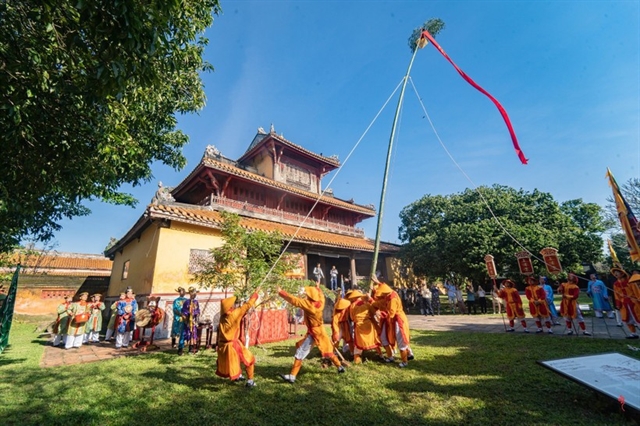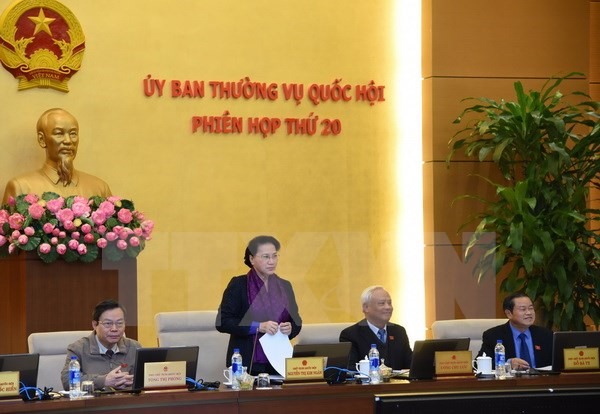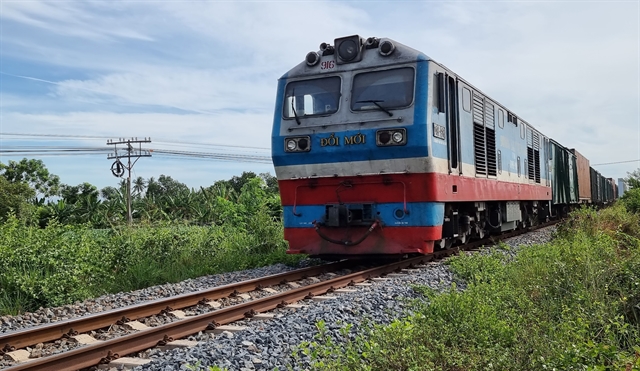 Politics & Law
Politics & Law

The National Assembly’s Standing Committee (NASC) yesterday rejected a draft resolution on administrative penalties for violations in State auditing, saying it lacked jurisdiction over the issue.
 |
| NA Chairwoman Nguyễn Thị Kim Ngân speaks at a meeting of the National Assembly’s Standing Committee (NASC) yesterday. — VNA/VNS Photo Phương Hoa |
HÀ NỘI — The National Assembly’s Standing Committee (NASC) yesterday rejected a draft resolution on administrative penalties for violations in State auditing, saying it lacked jurisdiction over the issue.
The committee was holding its 20th session, the first for 2018, which will weigh in today on controversial issues related to laws on national defence, cyber security and special economic-administrative units.
Preparations for the 26th annual meeting of the Asia-Pacific Parliamentary Forum (APPF-26) are also on the agenda.
Highlighting difficulties faced by the national auditing agency, Auditor General Hồ Đức Phớc told the NASC: “In 2017 alone, there were 121 cases where necessary documents were not provided, making audit work impossible.”
Phớc also said that a high percentage of recommendations made by the State Audit Office for State organisations and agencies were never implemented.
He said the failed recommendations accounted for 35.7 per cent of the total proposed in 2015, involving more than VNĐ8.1 trillion (US$360 million). In 2016, this was slightly lower at 24.4 per cent, at VNĐ5 trillion.
“Such failure (to act) caused losses to State revenue and affects the efficiency of auditing work,” he said.
Phớc blamed a lack of robust administrative levies for wrongdoings regarding auditing, and asked the NASC to issue a resolution to address the issue.
National Assembly (NA) Deputy Chairman Uông Chu Lưu responded that it was not the NASC, but the NA that had the jurisdiction to determine and approve regulations on administrative punishment regarding any given sector. Other lawmakers agreed, and rejected the proposal.
Extra resettlement funds
The lawmakers also discussed an extra VNĐ170 billion proposed by the Ministry of Agriculture and Rural Development to compensate and resettle residents dislocated by the Tà Pao irrigation system project in central Bình Thuận province; and the upper Kroong Pách reservoir project in the Central Highlands province of Đắk Lắk.
Agriculture Minister Nguyễn Xuân Cường said that the original VNĐ470 billion planned for resettlement in the two projects was no longer sufficient due to changes in resettlement policies.
NA Chairwoman Nguyễn Thị Kim Ngân disagreed with the proposal, saying that the adjustment could slow the projects.
The NASC asked the Government to review the two projects and assess needed financial adjustments, as also other irrigation projects currently in need of capital for compensation and resettlement. The review reports are expected to be submitted to the NASC at its next meeting session.
Cyber security law
Later the same day, the lawmakers discussed the draft Law on Cyber Security.
Most deputies agreed on the need to set up an important information system related to national security and for clear regulations on different kinds of information systems.
They also agreed with the regulation requiring foreign businesses who provide networking and other Internet-based services in Việt Nam with more than 10,000 local users to set up representative offices and install servers managing data on Vietnamese users in Việt Nam. They said it was necessary to facilitate State management of security, preventing the use of such networks and the internet to violate the nation’s laws.
The committee also agreed with providers being also required to follow the Government’s orders to prevent and remove any information that threatens national security, social order and the legal interests of Vietnamese organisations or individuals.
Chairwoman Ngân stressed that the draft law should abide by the Constitution and be in sync with the legal system.
The drafting board should continue reviewing the laow to prevent overlapping and prevent any limitation of human rights, including the rights to access information as enshrined in the Constitution required under the nation’s international commitments, she said.
The lawmakers also discussed draft revisions to the Law on National Defence. — VNS




